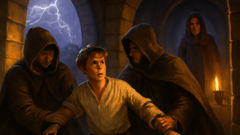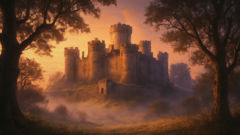Introduction
In the heart of medieval Hampshire, where rolling meadows meet dense forests and ancient rivers wind through emerald valleys, the legend of Bevis of Hampton was born. Tales of his deeds traveled from the hearths of humble peasants to the grand halls of kings. In a land divided by feudal rivalries and threatened by foreign invaders, stories of hope and heroism were precious—none more so than the saga of a boy betrayed by those closest to him, only to rise as a champion whose courage became the stuff of legend. The green fields near Southampton, shrouded in morning mist, once echoed with laughter and innocence, but treachery soon stole Bevis’s childhood. Sold into slavery by his own mother and her scheming lover, the young heir was cast adrift into a world of cruelty and uncertainty. Yet, within Bevis burned a spirit unbroken—a fierce will to survive, to fight, and to reclaim the destiny ripped from him. Across continents and kingdoms, Bevis’s journey would see him endure servitude, face monstrous giants and fire-breathing dragons, and win the loyalty of friends who believed in his cause. Along the way, he would discover love in the unlikeliest of places, test his heart against despair, and learn that true nobility is forged in the crucible of hardship. This is a story of ancient England, where valor was measured not just by the sword, but by the strength of one’s soul. The saga of Bevis of Hampton, though centuries old, still speaks to anyone who has ever fought for justice, longed for home, or refused to bow to fate. Let the legend unfold—of battles lost and won, of bonds broken and mended, of dragons vanquished and kingdoms restored. Here, in the shadow of Hampton’s old stones, begins the tale of a hero whose name would never be forgotten.
Betrayal in Hampton: The Lost Heir
Long before Bevis’s name became a rallying cry, Hampton was ruled by Guy, a just and respected lord. His marriage to the beautiful but ambitious Lady Murdina brought both joy and unrest to the castle’s halls. For Guy was a man of honor, while Murdina nursed dreams of greater power—dreams she would pursue at any cost.

Bevis was their only child, a spirited boy with laughing eyes and a heart open to all. He learned the ways of the sword in the shadow of Hampton’s high towers, his days filled with lessons from loyal knights and quiet evenings by the fire. Yet beneath the surface, trouble brewed. Lady Murdina, weary of her husband’s piety and drawn to the dark charisma of Sir Mordrain, plotted in secret. Their forbidden union was whispered about in the corridors, and soon their ambitions turned to malice.
The night that changed everything arrived with a tempest. Rain lashed the castle walls as Guy prepared for a journey to Winchester, leaving Bevis in his mother’s care. But Murdina’s heart had hardened; she saw her son not as flesh and blood but as an obstacle. In the dead of night, while Bevis dreamed of riding beside his father, strangers crept into his chamber. Rough hands seized him, muffling his cries. He awoke in the hold of a merchant ship, bound for distant lands—his mother’s betrayal complete.
Days passed in confusion and fear. The ship’s master, a ruthless Saracen trader, delivered Bevis to the court of King Ermin in Armenia. There, among strangers who spoke in strange tongues and lived by strange laws, Bevis’s new life began—not as a prince, but as a slave. His noble lineage meant nothing here; he was forced to labor in stables and kitchens, mocked by other servants and watched by the king’s harsh overseers. Loneliness gnawed at him, but the fire in his chest refused to die.
Yet hope sometimes flickers in unlikely places. King Ermin’s daughter, Princess Josiane, was drawn to the silent, stoic youth from the West. She saw courage where others saw defiance, and her kindness became a balm for Bevis’s wounds. She offered him secret words of comfort and smuggled crusts of bread when hunger bit deep. Still, Bevis knew his place was not here, and every night he dreamed of home—the green hills of Hampshire, his father’s gentle voice, the promise of a life stolen.
Years passed. Bevis grew from boy to man, his strength honed by hard work and daily indignities. He became renowned among the king’s horsemen for his skill with blade and steed, though the nobles still scorned him as a foreign slave. Josiane watched his spirit grow ever brighter, her heart quickening at his every triumph and silent sorrow. But fate, always turning, had greater trials in store for the lost heir of Hampton.
The Trials of the Slave: Giants and Dragons
In the court of King Ermin, Bevis’s reputation grew despite his status. Whispers traveled through palace halls: the Western slave had bested a Saracen captain in a mock tournament, unseating him with a single blow. The king, ever prideful of his warriors, took notice. He decided to test this foreigner’s mettle—and perhaps rid himself of a troublesome legend at the same time.

One morning, Bevis was summoned to the throne room. Ermin’s challenge was clear: beyond the city’s walls lurked Ascapart, a giant feared by all—a beast who ravaged villages and snatched away cattle and children alike. None had survived an encounter with him. “Go,” Ermin commanded, “and slay the giant. Return alive and your chains will be broken.”
Josiane’s eyes filled with tears. “You’re sending him to his death!” she cried, but her father’s heart was unmoved. Bevis, though, met the challenge with steady resolve. The memory of his father’s teaching filled his mind: “A true knight fears no monster—he faces what must be faced.”
He rode out alone at dawn, clad in armor far too large for his frame but with a heart that dwarfed any steel. The countryside trembled beneath Ascapart’s footfalls. The giant was a monster from ancient tales—twelve feet tall, skin thick as oak bark, wielding a club carved from an entire tree. When Bevis finally found him at the edge of a ruined hamlet, he felt the weight of destiny settle on his shoulders.
Their battle shook the earth. Ascapart swung his club, splintering stones, but Bevis dodged with nimble grace, his sword singing as he darted in and out of reach. For hours they fought—steel clashing with bone and bellowing fury. At last, Bevis spotted the giant’s weakness: a scar beneath his left arm. With a desperate cry, he leapt, driving his blade deep. Ascapart howled, staggering before crashing to the ground with a final thunderous crash. The villagers emerged from hiding, weeping with relief.
Bevis returned to Ermin’s court with the giant’s head, earning both freedom and renown. Josiane rushed to embrace him, but new dangers soon loomed. For Ermin’s pride could not tolerate such defiance, and rumors spread that he plotted Bevis’s death by other means.
Not long after, word reached Ermin that a dragon had awakened in the mountains, laying waste to farms and terrorizing travelers. Hoping to rid himself of Bevis once and for all, the king declared, “If you are truly a hero, destroy this beast.” Josiane begged her beloved to flee, but Bevis would not abandon the people who had shown him kindness.
Armed with only his wits and an old spear, Bevis ventured into the mountains. The dragon was a nightmare made flesh: scales like hammered bronze, eyes burning with malice, smoke curling from its nostrils. Its lair stank of death and old bones. Bevis crept close as the monster slept, but a misstep sent loose stones tumbling. The dragon awoke in a fury. Fire roared from its mouth, scorching the air.
Bevis darted behind boulders, always moving, searching for an opening. When the dragon lunged, he plunged his spear into its throat. Flames erupted, searing his arm, but he held fast. At last, with a final, shuddering gasp, the beast collapsed. Bevis staggered from the cave, battered but alive, his legend growing with every telling.
Ermin could no longer deny Bevis’s heroism. The people celebrated their savior, and Josiane declared her love openly. Yet even as Bevis won glory in a foreign land, his heart yearned for Hampton. The memory of betrayal, and the promise of redemption, would not let him rest.
Return to Hampton: Love and Vengeance
With giants and dragons laid low, Bevis’s fame soared across Armenia. Yet peace eluded him. King Ermin, jealous and suspicious, saw Bevis as a rival for his daughter’s affections. One night, as Josiane and Bevis planned their escape, Ermin’s men seized Bevis and cast him into the dungeons. Josiane, brave and resourceful, slipped through secret passages to set him free. Together, they fled the city under moonlight, aided by loyal servants who risked their lives for love.

Their journey back to England was perilous. Across deserts and mountains they traveled, pursued by bounty hunters and Saracen warriors. Bevis wielded his sword with grim determination, defending Josiane from countless dangers. As they sailed for home, a fierce storm shattered their ship on rocky shores. Cast ashore in Normandy, the lovers sought refuge among monks and merchants, always wary of betrayal.
Word reached them that Hampton was in ruins. Sir Mordrain and Lady Murdina had seized power after Lord Guy’s mysterious death—rumors claimed poison or treachery. The villagers lived in fear, the fields untended, the castle a place of cruelty. Bevis’s heart burned for justice. He pledged to return home and reclaim all that was lost.
Disguised as a wandering knight, Bevis slipped back into Hampshire. Few recognized the scarred, weathered man as the lost heir. He gathered allies—old retainers still loyal to Lord Guy, outlaws who despised Mordrain’s tyranny, and villagers hungry for hope. Josiane moved among the people as a healer, winning their trust and admiration.
Mordrain, grown fat and arrogant in his stolen power, dismissed rumors of revolt. Lady Murdina, haunted by guilt and fearful of exposure, withdrew to her chambers. But Bevis’s return inspired whispers and secret meetings. The fires of rebellion were kindling.
One stormy night, Bevis called his followers to arms. Under cover of darkness, they stormed Hampton castle. The battle raged through courtyards and great halls—steel clashing, banners falling, torches hissing in the rain. Bevis confronted Mordrain in the old chapel, where his father had once prayed. The traitor fought fiercely, but Bevis’s fury could not be matched. With a final blow, Mordrain fell.
Lady Murdina was brought before her son. Her beauty had faded, replaced by hollow eyes and trembling hands. “Why?” Bevis asked, his voice thick with pain. She wept, confessing her crimes and begging forgiveness. Bevis turned away, granting her exile rather than death—his mercy a final act of grace.
At dawn, the castle gates opened to welcome the people of Hampton. Bevis stood on the ramparts beside Josiane, his banner flying high. The lost heir had returned—not as a prince seeking vengeance, but as a hero who had won back not just his home, but the hearts of all England.
Conclusion
With Mordrain vanquished and justice restored, Hampton flourished under Bevis’s rule. The castle’s empty halls filled again with laughter and song; the fields yielded golden harvests; old wounds slowly healed. Beside him, Josiane became beloved as both lady and healer—her wisdom and compassion as renowned as her beauty. Bevis never forgot the trials he had faced or the price of mercy. He honored his father’s memory by ruling with fairness and courage, always remembering that true strength was forged in adversity. The tale of Bevis of Hampton spread far beyond Hampshire’s borders. Minstrels sang of his battles with giants and dragons; children dreamed of riding at his side. His story became a beacon to those who felt lost or betrayed, proof that hope endures even in the darkest hours. In the twilight of his years, Bevis would walk among his people, pausing by the old oak where he once played as a boy. He would smile at the laughter of children, grateful for a peace hard won and a legacy that would outlive stone and song. To this day, when mists curl over the hills and the sun gilds Hampton’s towers, people remember the hero who rose from slavery and sorrow to reclaim his birthright. The legend of Bevis endures—a tale of courage against impossible odds and the promise that every lost soul can find their way home.













